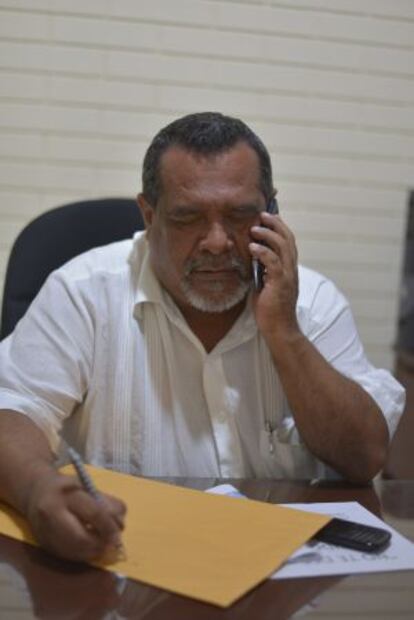Mediator between Maras gangs and El Salvador government confirms pact
Ex-guerrilla soldier Raúl Mijango says groups have agreed to end killings

El Salvador is seeing fresh signs of hope with the news that, without the involvement of the government, the leaders of the country’s main gangs may have agreed to new negotiations or a truce. Gangs, police, soldiers and groups suspected of social cleansing killings have been embroiled in conflict for decades. Ex-guerrilla soldier Raúl Mijango, who served as the mediator in the 2012 truce between the criminal organizations, confirmed the agreement to EL PAÍS in an interview.
This time Mijango has decided to keep a certain distance from negotiations. He has been questioned publicly by opposing sides over his participation in the so-called peace process and says he believes this new agreement will reduce the number of homicides and paves the way for a long-term solution for the Maras. According to the United Nations, El Salvador is one of the most violent places in the world. The current homicide rate is 60 per 100,000 residents. The 2012 truce reduced the murder rate from 15 to five killings a day but as the groups abandoned the agreement in 2014, the rate rose to 10 to 12 per day and statistics show an upward trend.
Question. What does this new agreement between the gangs mean?
Answer. The new gesture shows the gangs’ willingness to stop the violence, but it is, above all, a message that makes four things clear: the problem does have a solution; to reach that solution we must take the creator into account; without him there is no solution; and fourth, dialogue is what can lead to quick short-term solutions to this problem.
Q. What will be the difference between this truce and the previous one?
A. This one has a different context with fewer possibilities, fewer conditions, and there is less political will to find a solution through dialogue. As a human being and as a Salvadoran, I would like it to last but, as an analyst and as a person who knows the issue well, I am convinced that it will not last because the necessary conditions do not exist.
As a human being and as a Salvadoran, I would like it to last but, as an analyst and as a person who knows the issue well, I am convinced it will not”
Q. For example?
A. Political will, above all. To create a set of conditions that would allow gang members to change their way of life ...
Q. What do gang members say about this new attempt at dialogue?
A. It’s a unilateral gesture of goodwill to show that this does have a solution, to show that we still have the goodwill to contribute to solving this problem, that we want to make clear that this will not be solved without us, and in order to solve it we need conditions that do not currently exist and so we cannot guarantee that there will be stability, but we will make the effort. That’s what they say.
Q. And if leaders are aware of this problem, why do the lower ranks keep killing each other?
A. The lower ranks are soldiers. Soldiers who take marching orders from a mid-level command and then there are others higher up. These structures have gotten more complex over time and, as they have faced more problems, they have learned more.
Q. Does the government have a role in this process?
A. No way!
Q. Who signed, and where did they sign, the agreement?
A. I think that is irrelevant. The important thing is how and the results this process will bring about, and we can already see them from the obvious decrease in homicides.
Q. But why can’t we know who they were?
A. Well, it was those who have the power to do it: the leaders.
Q. What do you think the government should do to facilitate the process?
A. Well, the gangs are already committed to doing their part: to begin a dialogue with one another and those in power, and they have already shown that with this new gesture, which is not the first, or the second. It is one of many. With regard to the government, I cannot say what it should do because it has not asked me. But it must demonstrate goodwill and it must create conditions, especially employment, so that these young people can change their way of life and leave these hostilities behind.
Translation: Dyane Jean François
Tu suscripción se está usando en otro dispositivo
¿Quieres añadir otro usuario a tu suscripción?
Si continúas leyendo en este dispositivo, no se podrá leer en el otro.
FlechaTu suscripción se está usando en otro dispositivo y solo puedes acceder a EL PAÍS desde un dispositivo a la vez.
Si quieres compartir tu cuenta, cambia tu suscripción a la modalidad Premium, así podrás añadir otro usuario. Cada uno accederá con su propia cuenta de email, lo que os permitirá personalizar vuestra experiencia en EL PAÍS.
En el caso de no saber quién está usando tu cuenta, te recomendamos cambiar tu contraseña aquí.
Si decides continuar compartiendo tu cuenta, este mensaje se mostrará en tu dispositivo y en el de la otra persona que está usando tu cuenta de forma indefinida, afectando a tu experiencia de lectura. Puedes consultar aquí los términos y condiciones de la suscripción digital.








































